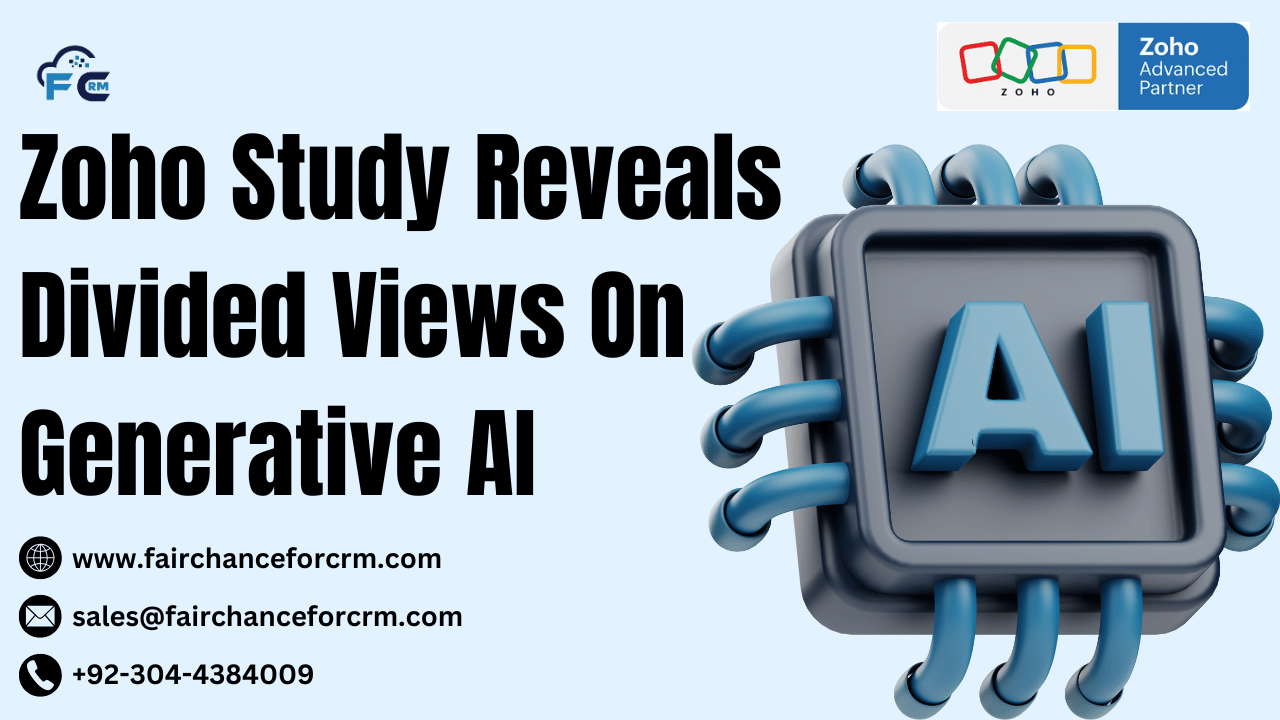Zoho Corporation, in collaboration with CRM Essentials, has unveiled the findings of its comprehensive “Data Privacy and Generative AI Usage” study, shedding light on the Zoho Study Reveals Divided Views On Generative AI in the workplace and the complex relationship employees have with this technology, particularly when it comes to concerns over data privacy.
The study surveyed 1,000 employees from a range of industries, company sizes, and professional disciplines, aiming to better understand how workers engage with Generative AI, their attitudes toward its use, and their growing concerns regarding the privacy of their data. The results highlight a marked contrast between those embracing the technology for productivity gains and those still hesitant to adopt it due to privacy concerns and unfamiliarity with its applications.
Also Read:
- Zoho Sign: The Ultimate Guide to Digital Signatures and Paperless Workflow
- Zoho PageSense – FAIRCHANCE FOR CRM
- Zoho Books API Complete Guidance
- Zoho WorkDrive Login: A Complete Guide to Accessing
- Zoho Thrive: Empowering Businesses with Marketing Automation
Zoho Study Reveals Divided Views On Generative AI
The Zoho Study Reveals Divided Views On Generative AI has made significant inroads into the workplace, although the adoption rate is still relatively low. A key finding from the survey is the stark divide between daily users of GenAI and those who have not yet embraced it:
- 24% of respondents reported using Generative AI daily, with 40% of these daily users claiming it has “significantly increased their productivity.”
- 37% of respondents indicated they had never used Generative AI, citing the lack of company mandate or encouragement as the primary reason.
Despite the slower adoption rate, those who actively use GenAI in their day-to-day work find substantial value. 17% of daily users reported that GenAI has become “indispensable” to their workflow.
Common Uses of Zoho Study Reveals Divided Views On Generative AI
The study also reveals that GenAI is typically utilized for repetitive tasks, with the following use cases being the most common among daily users:
- Finding quick answers to work-related questions: 19.9%
- Creating email content: 15.3%
- Video creation: 12.2%
- Summarizing long business documents: 11.6%
Interestingly, only 18% of all respondents use Generative AI exclusively for work, while 32.5% use it primarily for work-related tasks and 22.9% leverage it for both work and personal use. 16.5% of respondents use it for personal tasks only, suggesting that GenAI’s appeal stretches beyond professional boundaries.
Employee Sentiment Toward GenAI: Optimism with Caution
One of the most telling aspects of the study is the differing views toward Generative AI among daily users and non-users:
- 78% of daily users believe that AI will positively impact their work experience, while only 13% of non-users share this sentiment.
- 56% of daily users feel comfortable sharing personal data with GenAI tools, whereas just 12% of non-users share this confidence.
Despite this optimism, concerns persist. A significant portion of respondents expressed unease about the long-term implications of AI adoption:
- 46% of employees believe AI poses a threat to job security.
- 26% described AI as a “necessary evil”, acknowledging its utility but recognizing the potential risks.
- 74% of respondents expressed the need for government legislation to regulate how AI is trained using employee data.
- 75% called for legislation to govern intellectual property rights related to AI-generated content.
These findings point to a cautious optimism—a belief that while Generative AI can provide substantial benefits, employees are wary of its broader societal and economic impact.
Brent Leary, a Partner at CRM Essentials, emphasized that the survey reveals the urgency for businesses to take a strategic approach when adopting GenAI. “Companies are rushing to implement generative AI without a strategic plan,” Leary noted. “Our survey meets employees where they are by demystifying their sentiment towards AI and demonstrating the best paths forward in increasing adoption of this powerful new technology.”
The Data Privacy Paradox: Convenience vs. Caution
One of the most interesting aspects of the survey is the contradictory attitudes toward data privacy. Despite widespread concerns about potential privacy risks, the majority of respondents still prioritize convenience over caution when it comes to data sharing:
- 67% of respondents stated they prioritize convenience over data privacy, a finding that highlights the inherent trade-off many are willing to make for ease of use.
- Among daily users, 30% felt comfortable sharing personal data with GenAI tools.
- However, privacy concerns remain high among those hesitant to adopt AI, particularly regarding the sharing of sensitive data like:
- Financial information: 18.6%
- Personal identification details: 16.8%
- Location data: 12.2%
- Health details: 11.8%
These findings underscore a data privacy paradox in the workplace. While employees recognize the potential benefits of Generative AI, the need for proper safeguards and privacy protocols remains a top priority for many.
AI in Performance Evaluation: Human vs. AI
Another area explored by the study is how employees perceive the role of Generative AI in evaluating work performance. The results reveal a strong preference for human-based evaluation over AI:
- 39.3% of respondents preferred having their performance evaluated by humans.
- 12.2% were comfortable with AI conducting these evaluations.
- 16.3% felt equally comfortable being assessed by either AI or humans.
- 22.2% favored a combination of both AI and human evaluations, reflecting a growing acceptance of AI’s role in augmenting, rather than replacing, human judgment.
This finding indicates that while AI is seen as a valuable tool, many employees still place significant trust in human oversight, especially when it comes to evaluating their work and behavior.
Key Takeaways from the Zoho Study Reveals Divided Views On Generative AI
- Adoption of GenAI is still low but growing, with 24% of employees using it daily. However, those who do use it report significant productivity gains.
- Generative AI is primarily used for repetitive tasks like answering questions, creating emails, and summarizing documents, showing its value in streamlining work processes.
- Employee sentiment is divided: while daily users of AI are optimistic, many are still concerned about job security and the ethical implications of AI adoption.
- Data privacy remains a key concern: employees are cautious about sharing sensitive data with AI tools, but many are willing to prioritize convenience over privacy in certain contexts.
- There is a noticeable shift in how AI is perceived in performance evaluations, with many employees preferring a human touch in assessing their work.
Conclusion: A Balanced Approach to AI Adoption
The Zoho study highlights the growing potential of Generative AI to transform work processes, but also underscores the need for strategic and thoughtful adoption. As employees become more familiar with AI’s capabilities and limitations, organizations must address privacy concerns and develop clear, transparent guidelines for using these technologies responsibly. Education, training, and government regulation will be key factors in ensuring that Generative AI is leveraged to its full potential, without compromising employee trust or privacy.
As businesses continue to explore the potential of AI, the key to success will be a holistic, balanced approach that integrates GenAI into workflows while keeping data security and ethical considerations front and center.
For more information about the Zoho Study Reveals Divided Views On Generative AI , visit this link.
If you want to Free Trail Zoho, click on this link.




